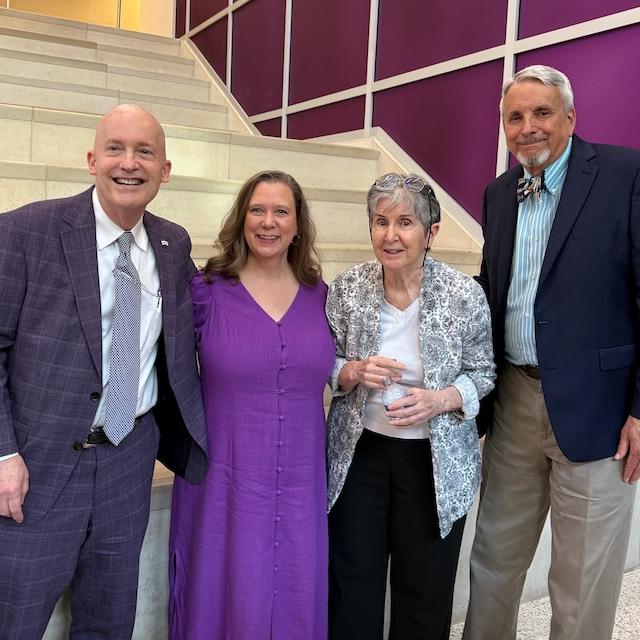
Chancellor Victor J. Boschini, Jr., with library leaders past and present: Tracy Hull, June Koelker and Bob Seal.
A Legacy of Library Leaders
In the 100th year of the Mary Couts Burnett Library, three library leaders take a trip down memory
lane.
If former Library Dean June Koelker could time travel, she’d go back to 1925. That’s
the year the Mary Couts Burnett Library first opened. Koelker, who served from 2006-2020,
would like to know if the library had electricity.
“I can’t imagine how one would have used oil lamps at night in a place full of books
– and the fire hazards that would have created,” she said, reflecting on the library’s
100-year history.
Koelker was one of three library leaders who came together recently to discuss the
library’s past, present and future during its 100th year. The others were Bob Seal, library director from 1994-2005, and Tracy Hull,
who stepped in as dean in 2020.
A few years before the building’s doors ceremoniously opened (and possibly its lamps
lit), the library’s namesake, a Fort Worth philanthropist, bequeathed her estate to
TCU, stipulating that a portion be set aside for a new library. Burnett, who also
left her private collection of 600 books to TCU, died before the library opened.
The quality and scope of the library’s books today – 1.3 million+ and nearly 1.6 million
digital versions – was noted by all three leaders; its special collections are what
they consider its treasures. Koelker pointed to the 1813 edition of Pride and Prejudice and Seal noted TCU as holder of one of two copies in the world of the “Pavier quartos,”
a collection of Shakespeare plays printed in 1619.
The three also agreed that the library has successfully evolved over the years, keeping
up with the needs of users and adapting with the times, tools and technology, including
endeavors such as converting from the Dewey Decimal System to the Library of Congress
Classification System and implementing a computerized circulation system.
Koelker recalled during her tenure that there were still index tables and card catalogs.
“It was a very traditional library with only a few computers,” she said. Today, the
library’s catalog is digitally integrated with other universities and research databases.
Hull noted the effort in recent years to make more space and provide modern amenities
for students.
“There were a lot of books, but few places to study,” she said of the period before
2000.
Among the solutions: opening the Bistro Burnett, a coffee café, whose addition was
overseen by Seal and was considered a significant change for libraries at the time.
The library also added Frog Pods, small group study spaces, and, for its most recent
renovation, enhanced study and computing areas and added space for patrons to congregate.
The effort to make the library a more social place is appreciated now, but in 2020,
during the COVID-19 pandemic, the library had to pivot to online services. That’s
when Hull gave herself the nickname “disaster dean.” In addition to those challenges,
a massive freeze in 2021 caused a pipe to burst.
“Water coursed over stacks and stacks of books,” Hull said. “The staff kept me going.
It was a hard time for us, but we got through it.”
Helping the staff and the library over the years includes support by the Friends of
TCU Library, which formed in 1972 to help with planning and fundraising. The leaders
credited their efforts and others generous gifts to allowing the library to renovate,
most recently in 2015.
That generosity also extends to the building’s art collection, including works by
Andy Warhol and Renaissance-era etchings.
Looking to the next 100 years, technological advancements will no doubt continue,
but Hull is confident that in 2125 there will still be books, even if digital. With
TCU’s goal to become a top-tier research institution, the library will have to grow
in both staff and its collection
“We’ll look at comparable universities to see what their ‘secret sauce’ is,” she said.
“It’ll be iterative and strategic.”
And, most likely, the library will physically stay where it is now, truly at the heart
of the campus. As the late Chancellor William Tucker, who served from 1979 to 1998,
once said: “All roads lead to the library, for it holds the past to the present, and
the present to the future.”
Read more about the library’s 100th year.
